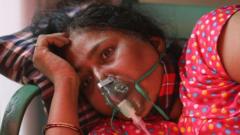In March 2020, India imposed its first nationwide lockdown in response to the Covid-19 pandemic, an unprecedented move that thrust the country into turmoil and despair. The health system faltered under the mounting pressures, leading to a staggering death toll that critics argue is significantly underreported. Years later, journalists from the BBC share personal anecdotes of pain and loss intertwined with their professional responsibilities during this crisis.
"Oxygen, oxygen, can you get me oxygen?" These haunting words echoed in Soutik Biswas's ears as he vividly remembers a frantic call from a woman desperate to save her husband. The summer of 2021 saw India gripped by a devastating second wave that left its major cities bereft of basic necessities like oxygen and medication. Biswas and his team dashed to assist individuals pleading for help, reflecting the dire hopelessness that enveloped many in Delhi.
Yogita Limaye poignantly encapsulated the collective grief that haunted families, illustrating a distressing moment outside a hospital when a woman begged futilely for medical attention for her unconscious brother—only to lose him before he could even see a doctor. As the crisis escalated, Limaye observed how individuals were left to fend for themselves amid the chaos, searching for beds and oxygen in an ineffective health system.
Vikas Pandey conveyed the heavy emotional toll of covering the pandemic. With multiple family members affected by Covid, the same desperation for assistance transformed his journalistic duties into personal battles. He recounted the harrowing loss of friends and relatives, reflecting a lingering guilt that many journalists grappled with as they tried to fulfill their roles while mourning private tragedies.
Geeta Pandey described the haunting atmosphere of deserted streets and bus stations as people scrambled to return home during lockdown. Despite the rising tide of anxiety and fear, the hope for a vaccine persisted. Sadly, for many, it was a fleeting promise, like the lost opportunity to visit elderly relatives who faced isolation and vulnerability.
Anagha Pathak's journey, documenting the aftermath of lockdown measures, opened a window into the struggles of migrant workers. She shared a poignant encounter with a young pregnant woman, who, like countless others, faced dire circumstances with little more than their determination to return home.
As five years pass since that pivotal moment in history, the harrowing testimonies of journalists underscore the profound losses endured and the enduring quest for survival amidst a pandemic that reshaped lives and societies. These stories serve as a reminder of the resilience of the human spirit in the face of unimaginable adversity.
"Oxygen, oxygen, can you get me oxygen?" These haunting words echoed in Soutik Biswas's ears as he vividly remembers a frantic call from a woman desperate to save her husband. The summer of 2021 saw India gripped by a devastating second wave that left its major cities bereft of basic necessities like oxygen and medication. Biswas and his team dashed to assist individuals pleading for help, reflecting the dire hopelessness that enveloped many in Delhi.
Yogita Limaye poignantly encapsulated the collective grief that haunted families, illustrating a distressing moment outside a hospital when a woman begged futilely for medical attention for her unconscious brother—only to lose him before he could even see a doctor. As the crisis escalated, Limaye observed how individuals were left to fend for themselves amid the chaos, searching for beds and oxygen in an ineffective health system.
Vikas Pandey conveyed the heavy emotional toll of covering the pandemic. With multiple family members affected by Covid, the same desperation for assistance transformed his journalistic duties into personal battles. He recounted the harrowing loss of friends and relatives, reflecting a lingering guilt that many journalists grappled with as they tried to fulfill their roles while mourning private tragedies.
Geeta Pandey described the haunting atmosphere of deserted streets and bus stations as people scrambled to return home during lockdown. Despite the rising tide of anxiety and fear, the hope for a vaccine persisted. Sadly, for many, it was a fleeting promise, like the lost opportunity to visit elderly relatives who faced isolation and vulnerability.
Anagha Pathak's journey, documenting the aftermath of lockdown measures, opened a window into the struggles of migrant workers. She shared a poignant encounter with a young pregnant woman, who, like countless others, faced dire circumstances with little more than their determination to return home.
As five years pass since that pivotal moment in history, the harrowing testimonies of journalists underscore the profound losses endured and the enduring quest for survival amidst a pandemic that reshaped lives and societies. These stories serve as a reminder of the resilience of the human spirit in the face of unimaginable adversity.





















